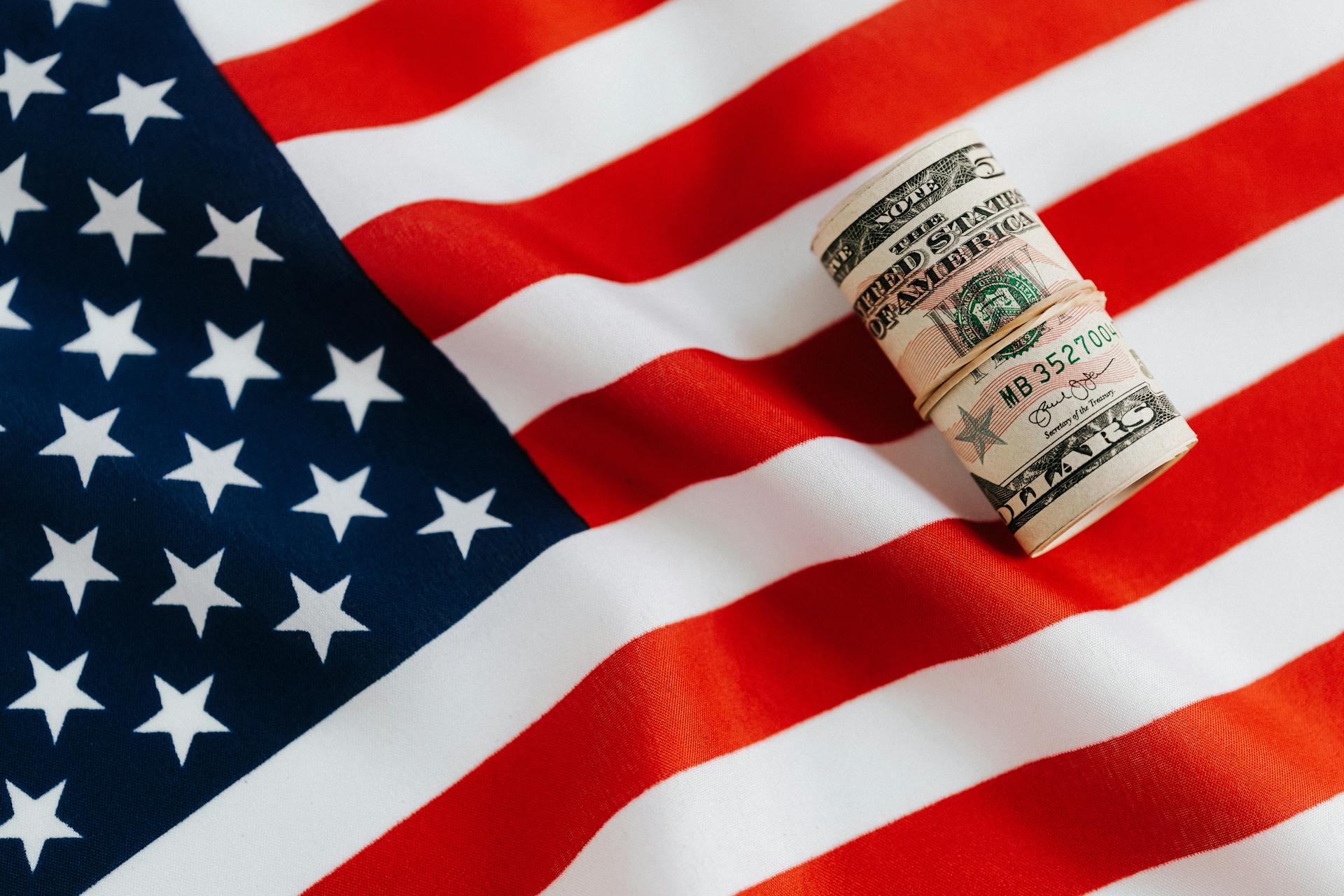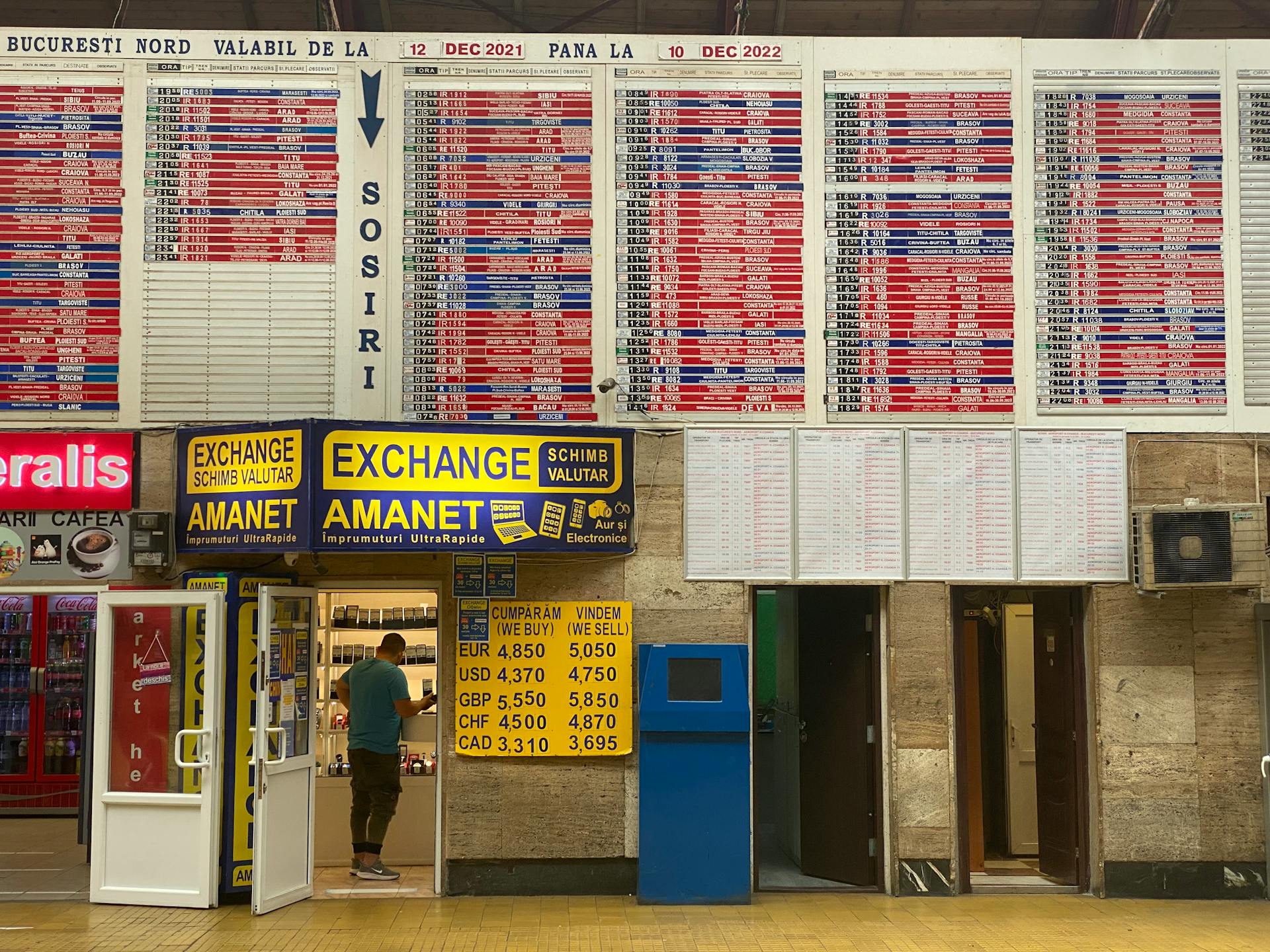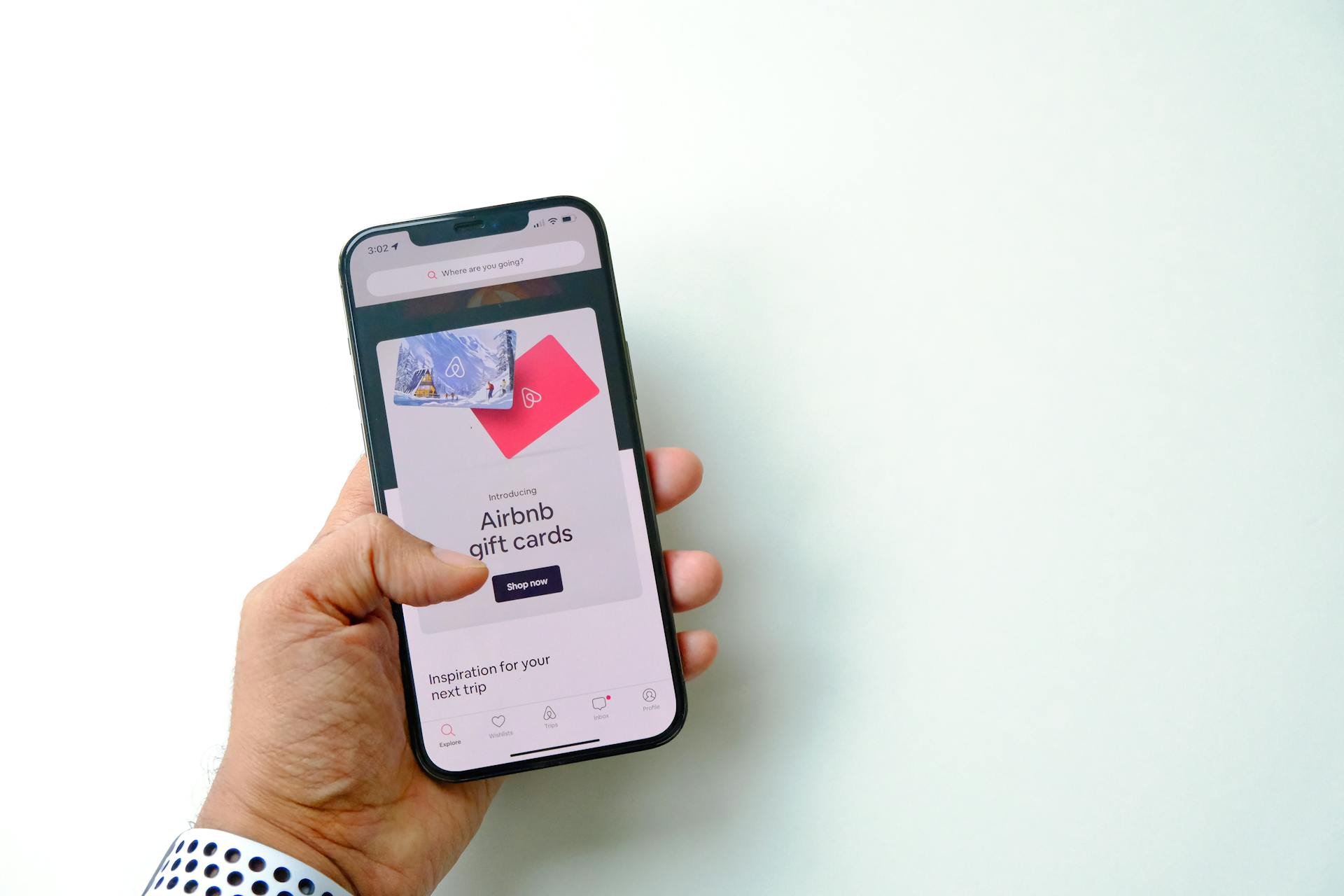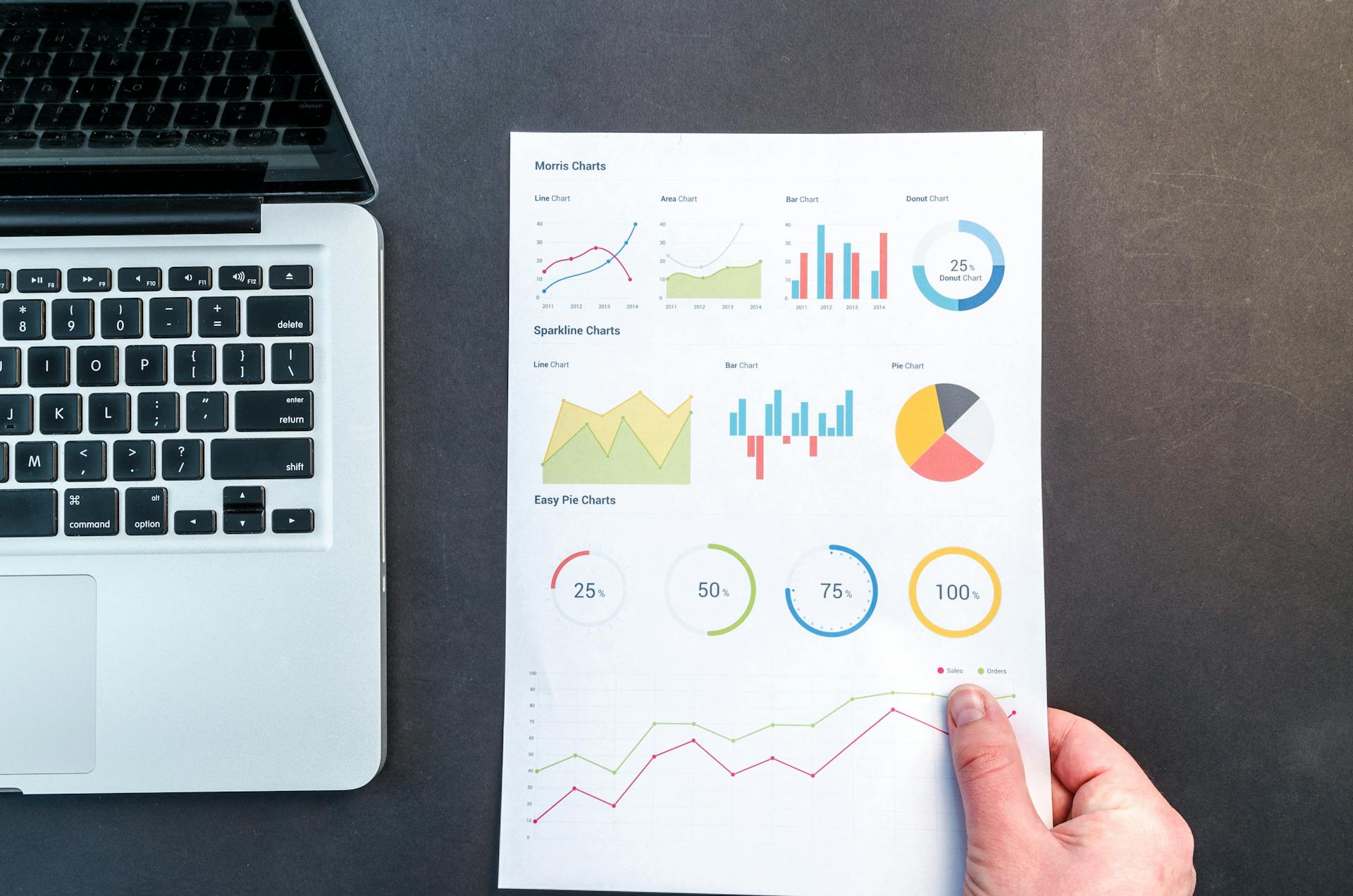
Currency conversion fees can be a significant cost when traveling or conducting business across borders. The fees are typically charged by banks and financial institutions for converting one currency into another.
These fees can range from 1% to 5% of the transaction amount, depending on the type of account and the financial institution. For example, a 3% conversion fee on a $1,000 transaction would cost $30.
You can avoid these fees by using alternative methods, such as prepaid currency cards or online currency conversion services. Some credit cards, like the Platinum Card from American Express, also offer no foreign transaction fees.
The conversion rate is another important factor to consider, as it can greatly impact the cost of your transaction. For instance, a 1% conversion fee on a $1,000 transaction would be $10, but if the conversion rate is unfavorable, you could end up losing more money.
Worth a look: Currency Conversion Fee vs Foreign Transaction Fee
Understanding Currency Conversion
Converting currency can be a costly affair, especially if you're not careful.
You'll generally get the best deal at your local bank or credit union, where some institutions will even waive added fees for their customers.
Using your debit card at an ATM affiliated with your bank can be a low-cost option, but be aware that using a credit card to get local currency at an ATM can be a costly mistake.
Foreign transaction fees can be a significant charge, typically around 3% of the purchase amount.
If you're making a large purchase, like a $5,000 item, you'll be hit with an extra $150 in fees.
These fees apply even if you're not physically using your card overseas, so be aware that buying an item online from a non-U.S. retailer can still incur a foreign transaction fee.
See what others are reading: Ally Bank Fees
Avoiding Fees and Charges
You can avoid foreign transaction fees by using a credit card with no foreign transaction fees, such as the Chase Sapphire Preferred or the Capital One Venture Rewards Credit Card.
On a similar theme: Currency Conversion Charges on Credit Cards
Carrying large amounts of cash has considerable risk associated with it, and you may not have access to the best rate by exchanging money before you leave.
Consider applying for a new credit card with no foreign transaction fees before your next trip, as you can maintain the security features of a credit card without the added cost.
The best way to get cash overseas in local currency is to use an established bank's ATM and pull money out in local currency, as banks like Charles Schwab offer free ATM withdrawals and will even reimburse ATM fees charged by the out-of-network ATM.
To avoid currency conversion fees, purchase in the local currency, use a reputable card network like Mastercard or Visa, or use currency conversion apps.
Some banks and online institutions have low foreign transaction fees or none at all, or will even reimburse you for fees charged by other banks when you use foreign ATMs.
If you're thinking about trading plastic for paper to save the fees, that can be tricky, too, as exchanging cash for the local currency can be costly.
Here are some popular credit cards with no foreign transaction fees:
- Wells Fargo Active Cash
- Chase Sapphire Preferred
- Amex Gold
- Amex Platinum
- American Express Black
- Chase Sapphire Reserve
- Capital One Venture X
- Chase Freedom Flex
- Citi Double Cash
Comparing Exchange Rates and Prices
Leading competitors in the money transfer industry have a secret: they add hidden markups to their exchange rates, charging you more without your knowledge.
They might also charge you a fee, and if they do, they'll often charge you twice, adding to your overall costs.
Wise, on the other hand, gives you the real rate, without any hidden fees or markups. This means you can trust that the rate you see is the rate you'll get.
See what others are reading: Venmo Seller Fee
Who Sets Rates?
Exchange rates can be set in two main ways: floating or fixed. In countries where exchange rates float, they're established by the financial markets.
Floating exchange rates can fluctuate continuously because currency exchanges trade 24/7 around the world. This means that exchange rates can change rapidly, even between minutes or seconds.
In countries with fixed exchange rates, a central authority sets the rates. This can provide stability for businesses and individuals who rely on currency exchange, but it may also limit flexibility in response to changing market conditions.
See what others are reading: Western Union Fx Rate
Compare International Money Transfer Prices
When sending money abroad, it's essential to compare international money transfer prices to get the best deal. Banks and traditional providers often have hidden markups in their exchange rates, which can cost you more than you think.
Leading competitors in the money transfer market have a dirty little secret: they add hidden markups to their exchange rates, charging you more without your knowledge. This can be frustrating, especially if you're not aware of it.
Wise, on the other hand, never hides fees in the exchange rate. We give you the real rate, so you can compare it with our competitors and see the difference for yourself.
Here are some key statistics that highlight the difference in exchange rates between Wise and traditional providers:
By choosing Wise, you can avoid hidden markups and get a great exchange rate every time. Our smart tech means we're more efficient, which means you get a better deal.
Alternatives to Traditional Exchange
If you live or work abroad, consider getting a multicurrency account, which lets you spend, receive, and hold multiple currencies. Fintech companies Wise and Revolut offer multicurrency accounts online and through mobile apps.
Another option is to use an online currency converter, which will have cash delivered to your home, but be aware that exchange rates are less favorable and delivery charges may eat into your funds.
See what others are reading: Online Currency Market
Multicurrency Account
If you live or work abroad, a multicurrency account is definitely worth considering.
You can spend, receive, and hold multiple currencies with a multicurrency account, making it a convenient option for those who frequently exchange money.
Fintech companies like Wise and Revolut offer multicurrency accounts online and through mobile apps.
These accounts are designed to simplify your financial life, saving you time and hassle.
Another Money-Change Option
Fintech companies like Wise and Revolut offer multicurrency accounts online and through mobile apps. These accounts let you spend, receive, and hold multiple currencies.
You can also order foreign currency through an online currency converter like Currency Exchange International, which will deliver the cash to your home. However, exchange rates are less favorable, and delivery charges may eat into your funds.
Online currency converters can be convenient, but it's essential to be aware of the potential drawbacks. Some online currency converters may charge higher fees than traditional exchange methods.
Consider using an online currency converter as a last resort, especially if you're not familiar with the exchange rates or fees associated with the service.
Tips and Advice
To minimize currency conversion fees, it's best to exchange currency at your bank or credit union before leaving the country. They often offer better rates and fewer fees compared to other exchange locations.
Before traveling, consider using a card without foreign transaction fees for purchases and online shopping. This can save you a significant amount of money in the long run.
Intriguing read: Chase Foreign Currency Exchange Fee
If you're abroad, use your financial institution's ATMs for currency exchange, as they usually have minimal fees. This is a much better option than exchanging currency at a foreign ATM or a currency exchange office.
To avoid conversion fees, pay in the local currency rather than U.S. dollars when making purchases abroad. You can specify this by telling the salesperson or making the selection on the screen or keypad when checking out.
Here are some tips to keep in mind:
- Use a card without foreign transaction fees for traveling and online shopping.
- Make purchases in local currency to avoid conversion fees.
- Download a currency conversion app before you travel to stay up-to-date on exchange rates.
Some credit cards, like those with no foreign transaction fees, can be a great option for international travel. However, be aware that even with these cards, you may still be charged a fee for converting currency.
Places to Avoid and Best Practices
If you're looking to avoid currency conversion fees, there are a few places to steer clear of. Airport kiosks, exchange houses, and tourist centers typically offer poor exchange rates and high fees, so it's best to use them as a last resort.
When exchanging currency, it's essential to be mindful of the places you choose to avoid these unfavorable rates. Airport kiosks, exchange houses, and tourist centers are notorious for taking advantage of travelers.
To avoid foreign transaction fees, look for credit cards that don't charge them. Many popular travel credit cards, such as the Chase Sapphire Preferred Card, Bank of America Travel Rewards credit card, and Capital One Venture Rewards Credit Card, offer this perk.
On a similar theme: Travelex Travel Card
Places to Avoid Exchanging
If you're looking to exchange currency, there are some places you should definitely avoid. Airport kiosks are a no-go, offering poor exchange rates and high fees.
You'll get less currency for your money if you exchange at an airport kiosk.
Exchange houses and tourist centers are also places to steer clear of, as they typically offer the same subpar exchange rates and fees.
Best Place to Get Money
Your best bet for getting money is to visit your bank or credit union. They often offer currency exchange to their customers, and it's usually the cheapest option.
You can order currency at a branch location, by phone, mobile app, or online, and have it delivered to you or pick it up at a branch. Some currency providers allow you to pick up your funds as soon as the next day, while others take one to three business days or offer overnight shipping.
Frequently Asked Questions
Who charges currency conversion fee?
VISA and MasterCard charge fees for foreign currency conversion on transactions made outside of the cardholder's home currency
Sources
- https://wise.com/us/currency-converter/
- https://www.nerdwallet.com/article/banking/where-to-exchange-currency-without-paying-huge-fees
- https://www.investopedia.com/currency-conversion-fee-definition-4768870
- https://www.forbes.com/advisor/credit-cards/foreign-transaction-fees-vs-currency-conversion-fees/
- https://www.nerdwallet.com/article/credit-cards/foreign-transaction-fee
Featured Images: pexels.com


